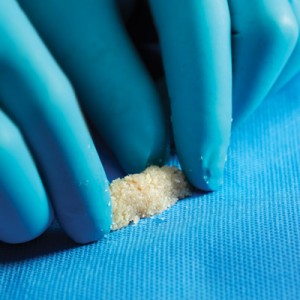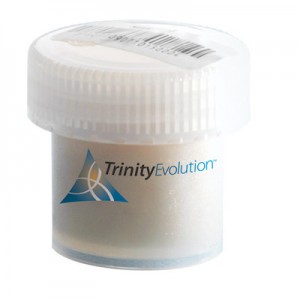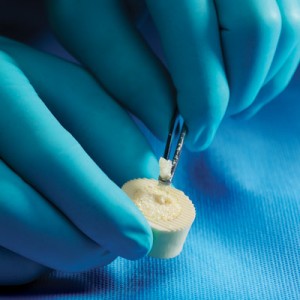Trinity® Evolution™ is an allograft of cancellous bone containing viable adult stem cells and osteoprogenitor cells within the matrix and a demineralized bone component. Trinity Evolution offers an ideal alternative to autograft and other bone grafting options (without their drawbacks).
Mesenchymal stem cells (MSCs) are multipotential, capable of responding to their environment to differentiate into a variety of cells as needed. When implanted in patients, MSCs and osteoprogenitor cells do not stimulate an immune response.
Trinity Evolution is processed by the Musculoskeletal Transplant Foundation (MTF), a nonprofit organization dedicated to providing quality tissue. Every step, from donor screening to cryopreservation and pre-release testing, is designed to maximize cell health and ensure patient safety.
Ensuring quality at every step:
- MTF is committed to excellence in tissue quality
- Cell health is maximized through donor criteria, processing, and vapor-phase liquid nitrogen storage
- Improved handling of consistent particle size and specific component ratios
Physician Benefits
Ensuring quality at every step:
- MTF is committed to excellence in tissue quality
- Cell health is maximized through donor criteria, processing, and vapor-phase liquid nitrogen storage
- Improved handling of consistent particle size and specific component ratios
Trinity Evolution supplies the three essential components for robust bone formation:
- Osteoconductive scaffold
- Verified osteoinductive potential
- A reliable number of viable osteogenic cells retained within the cancellous matrix
Clinical References:
- Rush S. Mesenchymal Stem Cell Allografting in Foot and Ankle Surgery. Foot & Ankle Specialist June 2010 Vol. 3(3):140-147.
- Pountos I, Giannoudis P: Biology of Mesenchymal Stem Cells. Injury 2005 Nov; Vol. 36 Suppl. 3:S8-S12.
- Barry FP, Murphy JM: Mesenchymal Stem Cells: Clinical Applications and Biological Characterization. International Journal of Biochemistry and Cell Biology 2004 Apr; Vol. 36(4):568-84.
- Bonab M et al: Aging of Mesenchymal Stem Cell in Vitro. BMC Cell Biology 2006 Mar 10; Vol. 7:14.
- D’Ippolito G et al: Age-Related Osteogenic Potential of Mesenchymal Stromal Stem Cells from Human Vertebral Bone Marrow.Journal of Bone and Mineral Research 1999 Jul; Vol. 14(7):1115-22.
- Sethe S et al: Aging of Mesenchymal Stem Cells. Ageing Research Reviews 2006 Feb; Vol. 5(1):91-116.
- Stolzing A et al: Age-Related Changes in Human Bone Marrow-Derived Mesenchymal Stem Cells: Consequences for Cell Therapies. Mechanisms of Ageing and Development 2008 Mar; Vol. 129(3):163-73.
- Le Blanc K et al: HLA Expression and Immunologic Properties of Differentiated and Undifferentiated Mesenchymal Stem Cells.Experimental Hematology 2003 Oct; Vol. 31(10):890-6.
- Ryan JM et al: Mesenchymal Stem Cells Avoid Allogeneic Rejection. Journal of Inflammation (London) 2005 Jul 26; Vol. 2:8.
- Mazur P: Freezing of Living Cells: Mechanisms and Implications. American Journal of Physiology 1984 Sep; Vol. 247(3 Pt 1):C125-42.



